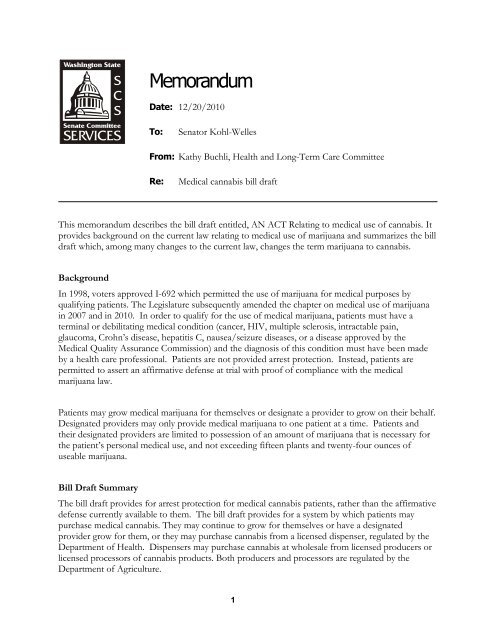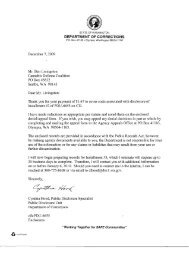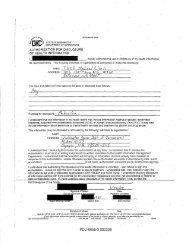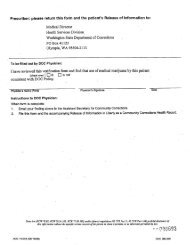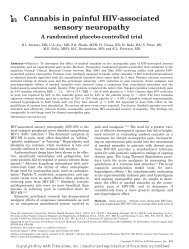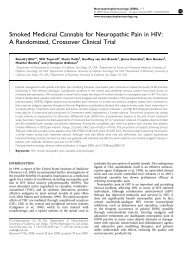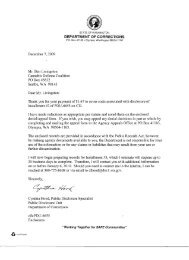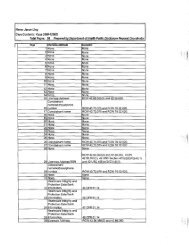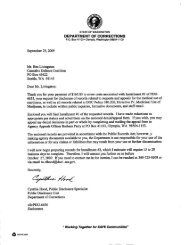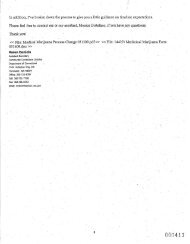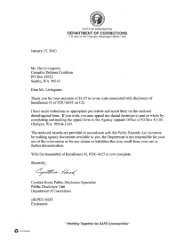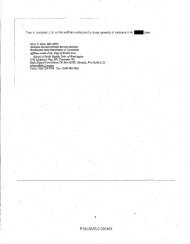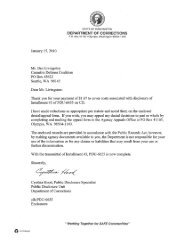Memorandum - Cannabis Defense Coalition
Memorandum - Cannabis Defense Coalition
Memorandum - Cannabis Defense Coalition
Create successful ePaper yourself
Turn your PDF publications into a flip-book with our unique Google optimized e-Paper software.
<strong>Memorandum</strong><br />
Date: 12/20/2010<br />
To:<br />
Senator Kohl-Welles<br />
From: Kathy Buchli, Health and Long-Term Care Committee<br />
Re:<br />
Medical cannabis bill draft<br />
This memorandum describes the bill draft entitled, AN ACT Relating to medical use of cannabis. It<br />
provides background on the current law relating to medical use of marijuana and summarizes the bill<br />
draft which, among many changes to the current law, changes the term marijuana to cannabis.<br />
Background<br />
In 1998, voters approved I-692 which permitted the use of marijuana for medical purposes by<br />
qualifying patients. The Legislature subsequently amended the chapter on medical use of marijuana<br />
in 2007 and in 2010. In order to qualify for the use of medical marijuana, patients must have a<br />
terminal or debilitating medical condition (cancer, HIV, multiple sclerosis, intractable pain,<br />
glaucoma, Crohn’s disease, hepatitis C, nausea/seizure diseases, or a disease approved by the<br />
Medical Quality Assurance Commission) and the diagnosis of this condition must have been made<br />
by a health care professional. Patients are not provided arrest protection. Instead, patients are<br />
permitted to assert an affirmative defense at trial with proof of compliance with the medical<br />
marijuana law.<br />
Patients may grow medical marijuana for themselves or designate a provider to grow on their behalf.<br />
Designated providers may only provide medical marijuana to one patient at a time. Patients and<br />
their designated providers are limited to possession of an amount of marijuana that is necessary for<br />
the patient’s personal medical use, and not exceeding fifteen plants and twenty-four ounces of<br />
useable marijuana.<br />
Bill Draft Summary<br />
The bill draft provides for arrest protection for medical cannabis patients, rather than the affirmative<br />
defense currently available to them. The bill draft provides for a system by which patients may<br />
purchase medical cannabis. They may continue to grow for themselves or have a designated<br />
provider grow for them, or they may purchase cannabis from a licensed dispenser, regulated by the<br />
Department of Health. Dispensers may purchase cannabis at wholesale from licensed producers or<br />
licensed processors of cannabis products. Both producers and processors are regulated by the<br />
Department of Agriculture.<br />
1
December 20, 2010<br />
The patient is permitted to show compliance with the law by possessing valid documentation that he<br />
or she is authorized to use medical cannabis. A voluntary registry system is also created within the<br />
Department of Health with which law enforcement must consult before conducting a warrantless<br />
search or arrest or seeking a search or arrest warrant. Valid documentation and registrations are valid<br />
for a one year period.<br />
Terminal or debilitating conditions. The use of cannabis by patients who have a terminal or<br />
debilitating medical condition is permitted. Terminal or debilitating medical conditions remain as<br />
defined in current law except that the requirement that the condition be unrelieved by standard<br />
treatments or medications is removed.<br />
Arrest/search protection.<br />
<br />
<br />
Medical cannabis patients and their designated providers are protected from arrest, search,<br />
prosecution, and other civil or criminal consequences for use of medical cannabis if:<br />
o The patient or provider possesses no more than 15 cannabis plants and no more<br />
than 24 ounces of useable cannabis. <strong>Cannabis</strong> products are permitted and a patient<br />
or provider may possess no more than the amount of product that can be produced<br />
with up to 24 ounces of useable cannabis.<br />
o The patient or provider presents valid documentation to law enforcement when<br />
questioned about medical use of cannabis.<br />
o A copy of the health care professional's authorization and the patient or provider's<br />
contact information must be posted prominently next to cannabis at the residence.<br />
o The designated provider has not converted medical cannabis for personal use and<br />
has not served as a designated provider to another patient for at least fifteen days.<br />
Medical cannabis patients and their designated providers may sign up on the Department of<br />
Health registry. Before making a warrantless arrest or search or before seeking a search<br />
warrant or arrest warrant based on a cannabis-related incident, law enforcement officers<br />
must consult with the registry and determine whether the person is a registered medical<br />
cannabis patient.<br />
o Registered persons may not be arrested or searched and registered locations may not<br />
be searched or seized unless there is evidence of conduct that would disqualify the<br />
person or location from the protections of the medical cannabis law or there exists<br />
probable cause that another criminal offense has been or is being committed.<br />
Affirmative defense. Qualified patients or designated providers who do not qualify for arrest<br />
protection may assert an affirmative defense at trial if:<br />
2
December 20, 2010<br />
<br />
<br />
<br />
The amount of cannabis in the patient's possession exceeds 15 plants or 24 ounces of<br />
useable cannabis and the patient establishes that the excess amount is necessary for the<br />
patient's medical use.<br />
The patient does not provide law enforcement with valid documentation that he or she is a<br />
qualified patient or does not provide evidence that he or she is a registered patient, but is<br />
able to establish at trial that he or she was a qualifying patient at the time of arrest.<br />
The patient is a nonresident of the state, is authorized to engage in the medical use of<br />
cannabis under the laws of another state, is otherwise within the provisions of the medical<br />
cannabis law, and presents the documentation of authorization required under the patient's<br />
authorizing state law to law enforcement when questioned about the use of cannabis.<br />
Collective gardens. Up to 25 patients may participate in a collective garden. Collective gardens<br />
permit these patients to grow cannabis cooperatively but they may contain no more than 15 plants<br />
per patient and up to 99 plants total.<br />
Designated providers. A designated provider is a person who has been designated by a patient to<br />
serve as a provider of cannabis. A designated provider may grow cannabis for only one patient at a<br />
time during a 15 day period. The patient may revoke the designation of a specific provider and<br />
designate a different provider at any time.<br />
Other patient and provider provisions.<br />
<br />
<br />
<br />
<br />
Parental rights may not be restricted solely due to medical use of cannabis unless this use<br />
results in a long-term impairment that interferes with the performance of parenting<br />
functions.<br />
A patient may not be refused, discharged, or discriminated against in employment solely as a<br />
result of off-site medical use of cannabis so long as this use does not violate federal law and<br />
the work does not involve public safety or involve the handling of hazardous materials or<br />
heavy equipment.<br />
A patient may not be refused or evicted from housing.<br />
A patient awaiting an organ transplant may not have his or her use of medical cannabis used<br />
as the sole disqualifier for an organ transplant.<br />
Department of Corrections. In imposing a criminal sentence, deferred prosecution, order of<br />
continuance, deferred disposition, or dispositional order a court may permit the medical use of<br />
cannabis and exclude it as a reason for finding the offender has violated the terms of his or her<br />
sentence or order.<br />
Limitations on use of medical cannabis.<br />
3
December 20, 2010<br />
<br />
<br />
<br />
Patients may not use medical cannabis in a public place in a manner that would cause<br />
another person to identify the substance as cannabis.<br />
Health insurance providers are not required to reimburse a patient for the medical use of<br />
cannabis nor are health care professions required to authorize the medical use of cannabis.<br />
Employers are not required to make an accommodation for the on-site use of cannabis.<br />
Licensed producers and processors of cannabis products.<br />
<br />
<br />
Licensed producers and processors of cannabis products may be non-profit or for-profit<br />
businesses and must be licensed through the Department of Agriculture.<br />
Producers and processors are subject to the Business and Occupation tax.<br />
Department of Agriculture. The Director may adopt rules on the licensing of producers and<br />
processors of cannabis products, including monitoring and inspecting the production of medical<br />
cannabis, the approval of facilities of producers and processors, grades and standards suitable for<br />
inspection of medical cannabis, and security requirements for these businesses.<br />
Licensed dispensers.<br />
<br />
<br />
<br />
<br />
Licensed dispensers must be non-profit corporations and must be licensed by the<br />
Department of Health.<br />
Dispensers may sell seeds, seedlings, cuttings, plants, useable cannabis, and cannabis<br />
products to medical cannabis patients. These products must be purchased from licensed<br />
producers or processors.<br />
Patients purchasing at dispensing facilities are not subject to sales tax.<br />
Licensed dispensers are subject to the Business and Occupation tax.<br />
Department of Health. The Secretary of the Department of Health must adopt rules on licensing<br />
dispensers of cannabis, including requirements for inspection and recordkeeping and standards for<br />
the dispensing facility and equipment.<br />
Advertising. Producers, processors and dispensers may not advertise cannabis on broadcast<br />
television, radio or on billboards in a manner that promotes or tends to promote the use or abuse of<br />
cannabis.<br />
Registration - patients and designated providers.<br />
<br />
The Department of Health must adopt rules establishing a secure and confidential<br />
registration system. The registration system must permit law enforcement to verify whether a<br />
4
December 20, 2010<br />
<br />
health care professional has registered a person as a qualifying patient or a designated<br />
provider.<br />
Patients are not required to sign up on the registry. Those who do will pay a registration fee<br />
which is established on an income-based sliding scale.<br />
List of producers and processors.<br />
<br />
<br />
The Department of Agriculture must create and maintain a confidential list of producers and<br />
processors.<br />
Names and personally identifiable information may be released only to authorized<br />
Department of Agriculture employees or to authorized law enforcement employees as<br />
necessary to verify that a person is a producer or processor or that a location is the address<br />
of a production or processing facility.<br />
List of dispensers.<br />
<br />
<br />
The Department of Health must create and maintain a confidential list of persons who have<br />
a license to dispense medical cannabis.<br />
Names and personally identifiable information may be released only to authorized<br />
Department of Health employees as necessary to verify that a person is a dispenser or that a<br />
location is the recorded address of a licensed dispenser.<br />
5


